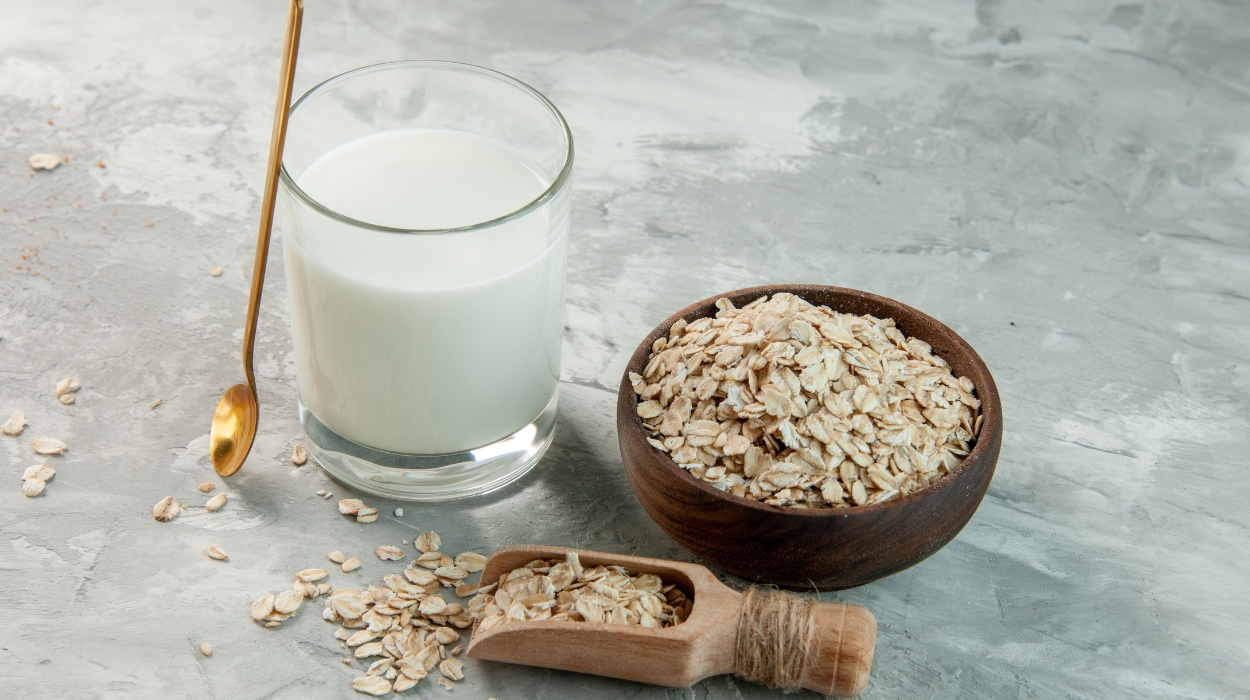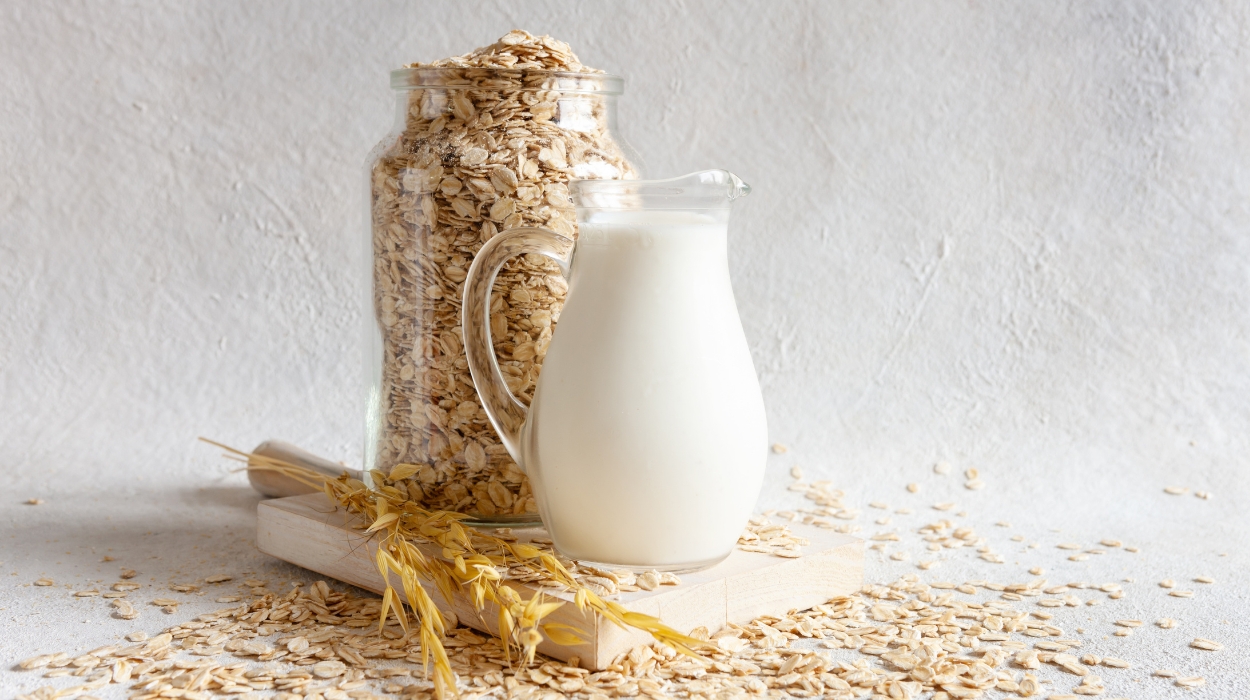Plant-based milk alternatives like oat milk have a variety of potential health benefits and may help you lose weight.
Many people consider cow’s milk good for weight loss, as it is rich in nutrients[1] and contains relatively few calories and carbohydrates. However, some individuals avoid dairy products for ethical and medical reasons. Fortunately, oat milk and other plant-based milk are widely available and provide a range of vital nutrients that can help to keep your body healthy.
So, why is oat milk good for weight loss, and how can cow’s milk alternatives improve your overall health?
Can Oat Milk Help You Lose Weight?
Oat milk is a plant-based alternative to cow’s milk. It is derived from whole oats and contains less fat and fewer calories than regular cow’s milk. Therefore, substituting oat milk and other plant-based milk alternatives in place of dairy milk may reduce your overall calorie intake and help you lose weight.
Is Oat Milk Good For Weight Loss?
Oat milk is a healthy and nutritious alternative to dairy for people who don’t want to drink cow’s milk, and it may be better for weight loss.
Humans are thought to have consumed animal milk and other milk products for around 10,000 years,[2] but not everyone can digest it. An estimated 68% of the global population[3] is lactose intolerant and experience uncomfortable digestive symptoms if they eat dairy. Furthermore, the dire mistreatment of animals by intensive dairy farming is becoming more widely known,[4] and, as a result, public perception of cow’s milk is slowly souring.
Luckily, alternatives to dairy milk are becoming more widely available every year, and there are a variety of plant-based options to choose from. One of the most popular is oat milk, a mild, creamy milk derived from whole oats. Oat milk is generally more digestible than dairy and maybe a better choice for those trying to lose weight.
Oat milk is thought to be better for weight loss than dairy milk primarily because it contains less fat.[5] It also contains an abundance of nutrients that can reduce blood sugar[5] and lower cholesterol levels. These health benefits may help to prevent serious health conditions like cancer, diabetes, and cardiovascular disease.
Although unsweetened oat milk is lower in fat and calories than whole cow’s milk, it contains significantly more carbohydrates.[5] Like any food, oat milk can cause weight gain if consumed in excess. It is best enjoyed as part of a varied, balanced diet and healthy lifestyle.
How Does Oat Milk Help With Weight Loss?
Drinking oat milk instead of dairy milk can aid weight loss for several reasons. The most obvious of these is oat milk’s comparatively lower calorie content; one cup of oat milk contains 120 calories,[6] whereas the same amount of whole cow’s milk contains 152 calories.[1] Calorie restriction is a cornerstone of weight loss, and consuming oat milk in place of regular cow’s milk can help reduce your overall calorie intake.
Oat milk also contains significantly less fat[7] than cow’s milk and is particularly low in saturated fat. Diets low in saturated fats are considered an optimal strategy for long-term weight management,[8] so oat milk is a good option for people trying to lose weight.
Oat milk is also rich in beta-glucan,[9] a type of soluble fiber found in cereals, fungi, algae, and yeast. Research shows that beta-glucans found in oats and oat milk can lower cholesterol levels,[10] which may reduce your risk of cardiovascular disease. Beta-glucans may also have anti-obesity properties that can help you shed excess pounds.
Several studies have found an association between beta-glucan consumption and a reduction in body weight and body mass index.[11] There are several potential reasons for this, one being that beta-glucan may enhance satiety or the feeling of fullness after eating. Beta-glucan may increase satiety-related hormones[12] and reduce energy intake, both of which can contribute to weight loss.
As a result, oat milk drinkers may have an easier time with weight management than those who drink dairy. When consumed as part of a healthy diet and paired with regular exercise, oat milk may help you reduce your overall body weight.
Oat Milk Nutrition Facts

One cup of unsweetened oat milk contains:[6]
- Calories: 120 calories.
- Protein: 3 grams.
- Fat:5 grams.
- Carbohydrates: 16 grams.
- Dietary Fiber: 1.9 grams.
It also contains many essential micronutrients, including calcium, iron, phosphorous, magnesium, potassium, riboflavin, and vitamin B12.
It contains fewer calories, less fat, and more dietary fiber than regular milk. However, it is not as nutrient-dense as dairy and contains less protein and fewer micronutrients. To reduce or eliminate dairy from your diet while maximizing your nutrient intake, consider drinking a variety of plant-based milks.
The most popular plant-based alternatives include rice, soy, coconut, and almond milk. Of these, soy milk has the highest protein content, with 6.3 grams per cup.[13] It is also rich in micronutrients, including calcium, magnesium, phosphorous, potassium, thiamin, riboflavin, niacin, and vitamins A and B6.
Almond milk contains less protein and fewer nutrients than oat milk, but it is an excellent source of vitamin E.[14] Coconut milk is very popular due to its flavor and antioxidant content;[15] However, it is also high in saturated fat and is not recommended for those trying to lose weight.
Best Time Drink Oat Milk To Lose Weight
You can drink oat milk for weight loss at any time of the day if it is consumed mindfully as part of a well-balanced diet. As long as you don’t have any medical conditions that impede weight loss, maintaining a calorie deficit will lead to a gradual reduction in body weight. Therefore, you can consume oat milk with breakfast, your midday snack, or supper.
However, the optimal time to consume oat milk maybe after a workout. Your body burns more calories during cardiovascular exercise or strength training than at rest, which can increase appetite. Studies have found that people often eat larger portions[16] of food after exercising, which can increase your calorie intake and sabotage your weight loss efforts.
One way to improve appetite control post-exercise is to choose highly satiating foods. The soluble fibers in oats and oat milk can help you feel full and may help you resist the urge to eat more. Other satiating foods you can eat after a workout include lean protein, fruit with yogurt or peanut butter, eggs, avocado, and smoothies.
If you want to lose weight more quickly, diet pills may help you drop a few pounds. The most effective weight loss pills contain fat burners, like caffeine. Caffeine is known to increase your metabolic rate,[17] meaning you will burn more calories at rest and may lose body fat at a faster rate.
Other Health Benefits Of Oat Milk

Oat milk may help you lose excess weight, but how else is oat milk good for you?
Oat milk contains a wide range of micronutrients and, as such, offers many nutritional benefits. For example, one cup of oat milk contains 25%[6] of your recommended daily value of calcium. Calcium is essential for bone health, and adequate calcium intake may reduce your risk[18] of osteoporosis and colorectal cancer.
Oat milk also contains 45%[6] of your daily value for riboflavin, a vitamin with antioxidant properties that can reduce your risk of various medical conditions. Getting enough riboflavin in your diet can help protect you against[19] sepsis, circulatory problems, and certain types of cancer.
Finally, a cup of oat milk delivers 50% of your daily value for vitamin B12. Vitamin B12 is an essential nutrient with many important roles in the body, and B12 deficiencies have been linked to an increased risk[20] of heart disease, mental health issues, and cancer.
Are There Any Side Effects Of Drinking Oat Milk?
Raw, unsweetened oat milk is generally safe for everyday consumption. Unfortunately, some oat milk brands contain added sugars. One cup of sweetened oat milk can contain around 7 grams of sugar,[6] making it less healthy and more calorific than pure oat milk.
Although oats are gluten-free, they are frequently contaminated with gluten[21] from other grains during processing. For those with gluten intolerance, this potential cross-contamination can make oat milk a risky choice. If you have gluten sensitivities, it is advisable to look for products at grocery stores that are specifically labeled as gluten-free or choose other plant-based milks.
If you want to avoid store-bought oat milk altogether, you can easily make your own oat milk at home. To make oat milk, simply add four cups of water to one cup of oats in a blender and blitz at high speed for 30 seconds. Next, strain the mixture through a thin towel and collect the liquid in a bowl.
Conclusion
Dairy-free and plant-based alternatives, like oat milk and nut milk, typically have less fat and fewer calories than cow’s milk. When enjoyed as part of a balanced diet, plant-based milks can help you reduce your calorie intake and may aid weight loss. Oat milk is also rich in essential micronutrients such as calcium, riboflavin, and vitamin B12 and, therefore, can help to improve the nutritional content of your diet.
Frequently Asked Questions
Drinking oat milk instead of whole milk can help reduce your overall calorie intake. Consuming fewer calories, especially from plant-based protein sources, can help you lose weight and reduce fat from all parts of your body, including your belly.
As with other types of food, excessive consumption of oat milk can lead to weight gain. Oat milk is low in fat but relatively high in carbohydrates, and drinking a lot of any milk will increase your daily calorie intake.
With only 39 calories per cup,[22] almond milk contains fewer calories than oat milk and may be better for weight loss. However, regarding oat milk vs. almond milk, almond milk contains less protein and may be less satiating.
 Evidence Based
Evidence Based
